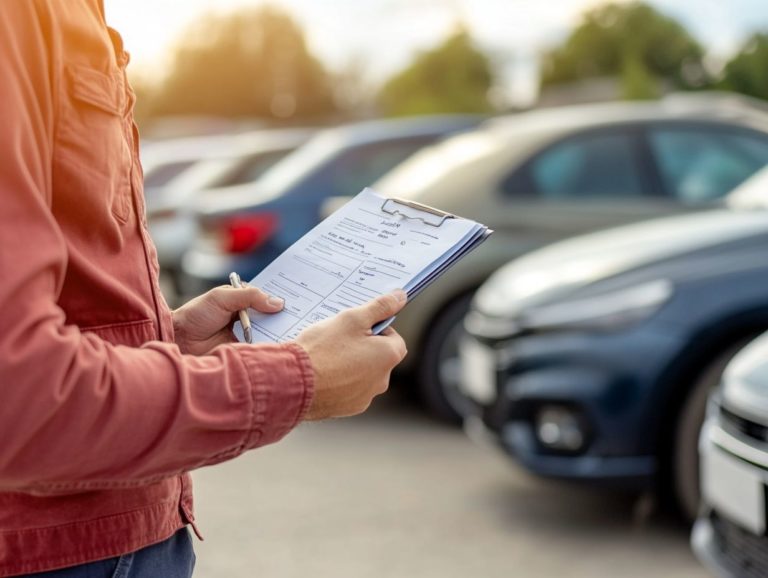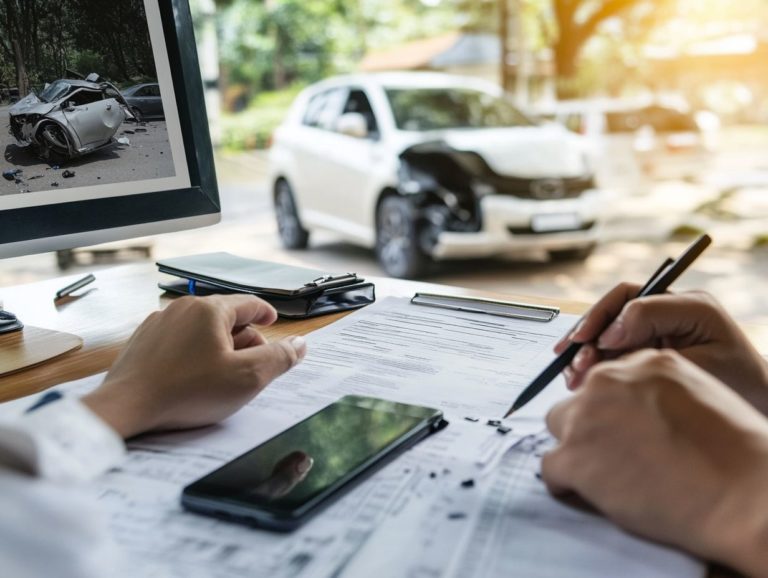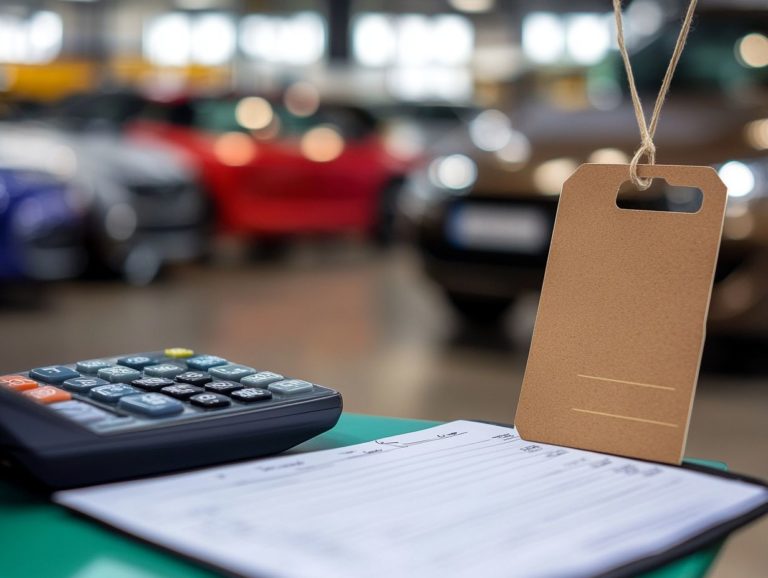5 Tips for Buying a Used Car from a Private Seller
Purchasing a used car can be both exhilarating and intimidating, particularly when navigating the world of private sellers. With a myriad of options at your fingertips, having the right knowledge is essential for making a well-informed decision.
This article delves into five vital tips for buying a used car from a private seller. You’ll learn the importance of conducting thorough research, checking the vehicle’s history, negotiating the best price, and ensuring that all necessary documents are meticulously organized.
It outlines the advantages and risks associated with private sales, highlights what to look for regarding a car s condition, and identifies potential red flags to be mindful of. By the end, you ll be equipped to drive away confidently in your next vehicle purchase.
Contents
- Key Takeaways:
- 1. Do Your Research
- 2. Check the Vehicle History Report
- 3. Have the Car Inspected by a Mechanic
- 4. Negotiate the Price
- 5. Get All Necessary Documents
- Why Should You Consider Buying a Used Car from a Private Seller?
- Frequently Asked Questions
- What are the top 5 tips for buying a used car from a private seller?
- Are there any red flags to watch out for when buying a used car from a private seller?
- What are some benefits of buying a used car from a private seller instead of a dealership?
- Is it necessary to have a contract when buying a used car from a private seller?
- Can I finance a used car purchased from a private seller?
- What should I do if I encounter problems with the car after purchasing from a private seller?
- Conclusion
Key Takeaways:
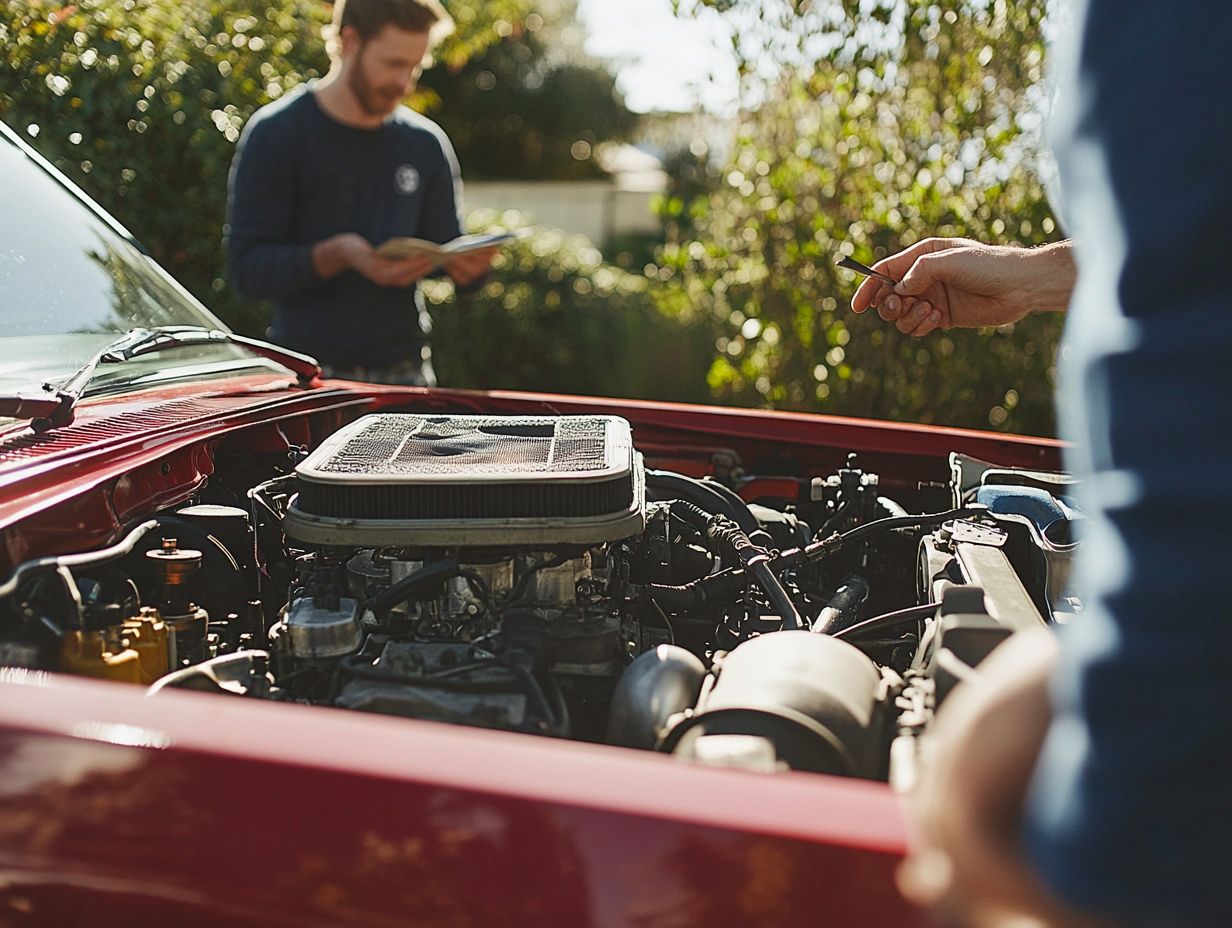
- Do thorough research on the make, model, and year of the car before making a purchase from a private seller.
- Obtain a vehicle history report to ensure the car’s history is clean and free of major issues.
- Have a professional mechanic inspect the car before finalizing the purchase to avoid potential hidden problems.
1. Do Your Research
Conducting thorough research is essential when you set out to purchase a used car, whether from a private seller or a dealership. This preparation arms you with vital information about the vehicle’s history, current market trends, and fair pricing, ultimately safeguarding your investment.
Using platforms like Kelley Blue Book and Edmunds allows you to compare prices and ensures you re not overpaying. It’s also important to explore classified ads and online listings to gain insights into local availability and pricing variations.
Assess the seller’s reputation through reviews and ratings. This provides an extra layer of security, helping you avoid potential scams that often lurk in the shadows of online transactions. By prioritizing these steps, you can navigate the used car market with confidence and make a well-informed decision.
2. Check the Vehicle History Report
A comprehensive vehicle history report is essential when you’re buying a used car. It unveils critical insights, such as accident history and previous ownership details, giving you the power to make informed decisions while potentially safeguarding yourself against lemon laws.
By obtaining this report from reputable sources like AutoCheck or Carfax, you can uncover vital information about the vehicle’s past that might not be immediately obvious. These reports offer a clear account of any accidents that have occurred, detailing the extent of the damage and whether proper repairs were carried out.
Additionally, thorough maintenance records can reveal how well the car was maintained over time, helping you avoid costly issues in the future. Being aware of any existing lemon law claims can also shield you from acquiring problematic vehicles. Thus, a vehicle history report isn’t merely a helpful tool; it’s an critical step towards ensuring a sound investment.
3. Have the Car Inspected by a Mechanic
Before you finalize your used car purchase, it s essential to have a mechanic conduct a thorough inspection before buying. This step is a must for a professional assessment of the vehicle’s condition and uncovers any hidden issues that could lead to costly repairs later on.
This process not only highlights immediate concerns but also gives you the opportunity to review the vehicle’s maintenance records. These records show how well the car was maintained over time. By having a qualified mechanic assess the car, you can identify potential problems, enabling you to negotiate more effectively and possibly lower the asking price.
Moreover, this inspection ensures you re investing in a vehicle that is safe and reliable, significantly enhancing your peace of mind and overall satisfaction with the purchase. Don’t skip this inspection; it can save you money and stress down the road.
Ready to find your perfect used car? Start your journey today!
4. Negotiate the Price

Negotiating the price of a used car is an important skill that demands preparation and effective communication. It s your opportunity to secure a price that accurately reflects the vehicle s condition and market value, as determined by reputable sources like Kelley Blue Book.
By conducting thorough research on the specific model you re interested in, you ll gain a clearer picture of its price range and arm yourself with persuasive arguments to support your offer.
When engaging with the seller, approach sensitive topics like price adjustments with finesse. Starting the conversation with compliments about the vehicle sets a positive tone, making the transition into negotiations smoother.
Always remember to keep the dialogue respectful. Showing gratitude for their time and understanding any constraints they may face can build a foundation of goodwill.
Ultimately, your goal is to arrive at a mutually beneficial agreement, ensuring both parties walk away satisfied.
Summary: Be prepared, respectful, and aim for a win-win during negotiations.
5. Get All Necessary Documents
Obtaining all necessary documents during a used car purchase is essential for a smooth transfer of ownership and provides vital protection through warranties and registration processes.
- Bill of Sale: This is an official record of the transaction, detailing the purchase specifics and confirming your ownership.
- Vehicle Registration: Necessary for legally operating your new car on public roads, ensuring compliance with local regulations.
- Financing Options: Familiarize yourself with ways to pay for your car, like loans or leasing. Knowing your choices can significantly impact your budgeting and long-term satisfaction.
- Warranties: Understand any warranties that may cover unforeseen repairs; being informed can save you from unexpected surprises down the road.
Summary: Collect all essential documents to ensure a hassle-free transaction.
Why Should You Consider Buying a Used Car from a Private Seller?
Buying a used car from a private seller offers a host of advantages. You may enjoy potentially lower prices and the chance to negotiate directly, creating a more personalized buying experience compared to traditional car dealerships. To make the most of this process, it’s essential to know how to prepare for buying a used car and assess the seller’s reputation!
This approach not only helps you save money but also fosters an environment where you can express your needs and preferences more openly. Moreover, prioritize asking pertinent questions to the seller. These inquiries can shed light on the vehicle’s history and condition.
By asking about past maintenance, reasons for selling, and any existing issues, you can gain a clearer understanding of the car s reliability.
Engaging in this dialogue allows you to evaluate the seller’s transparency and overall reputation, ultimately guiding you toward a more informed and favorable purchasing decision.
Summary: Engage with the seller to understand the vehicle’s history and condition.
What Are the Advantages of Buying from a Private Seller?
When you purchase a used car from a private seller, you unlock distinct advantages, such as the opportunity for a fair price and the ability to negotiate terms directly. To ensure you make an informed decision, consider the top 5 questions to ask before buying a used car. This direct engagement fosters better communication with the seller and enhances transparency regarding maintenance records.
By interacting directly with the current owner, you gain invaluable insights into the vehicle’s history, including any repairs or modifications that might not be immediately visible. This personalized interaction often reveals details that dealerships may overlook, providing you with a clearer understanding of the car’s condition.
Private sellers tend to be more flexible in negotiations, allowing for adjustments that cater specifically to your needs. This flexibility can lead to pricing that rivals, or even surpasses, what you might find at traditional dealerships, making it an appealing option for anyone looking to manage their budget effectively.
Summary: Enjoy direct engagement with private sellers for better deals and insights.
Are you ready to negotiate like a pro? Act quickly to seize the advantages of buying from a private seller, as the best deals go fast!
What Are the Risks of Buying from a Private Seller?
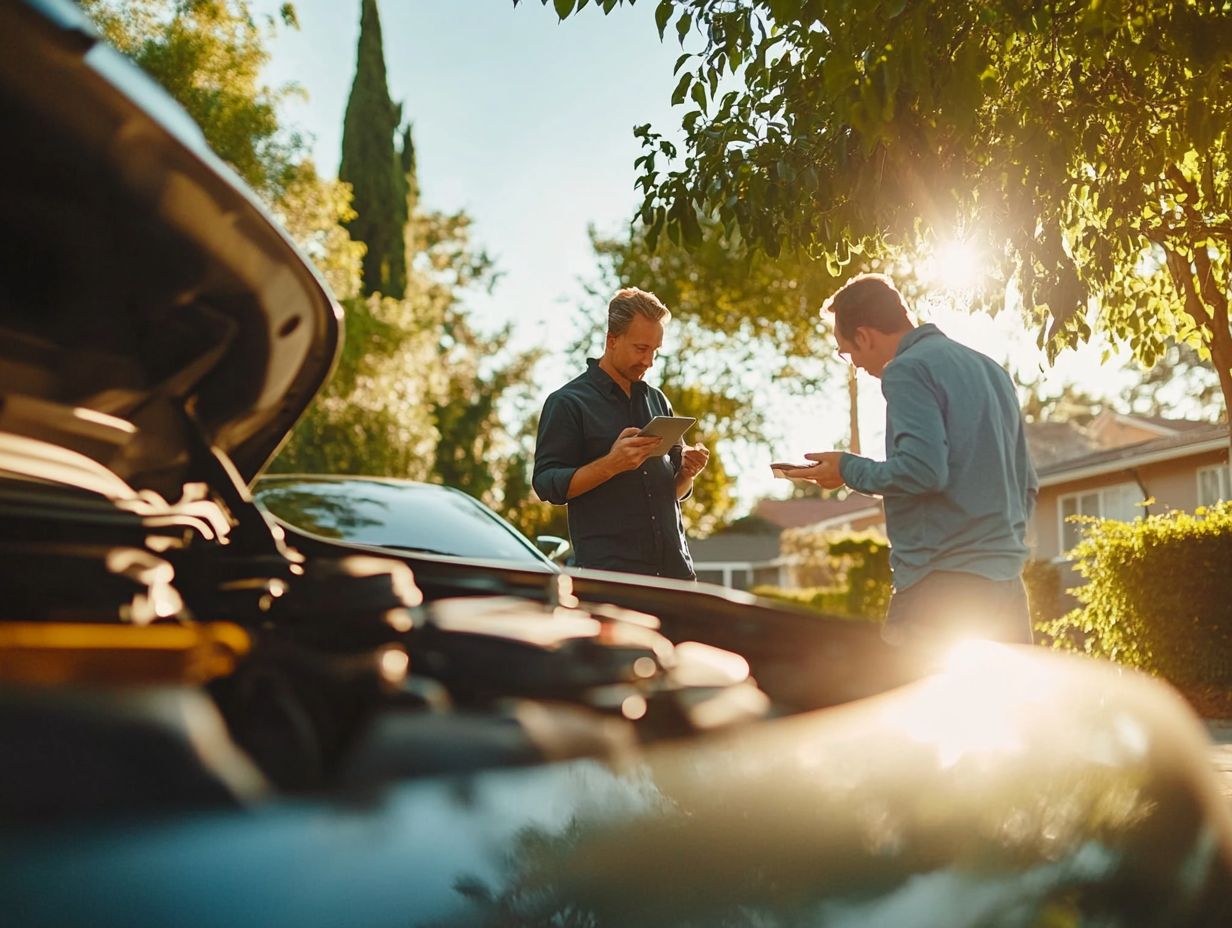
While buying from a private seller can present enticing advantages, it s essential to recognize the built-in dangers involved. You might face undisclosed vehicle history issues, lemon law complexities which protect buyers from defective vehicles and concerns about the seller’s reputation.
These risks could lead you to unknowingly acquire a vehicle with a hidden past, such as previous accidents or substantial mechanical issues that the seller conveniently overlooks. Navigating lemon law violations can be overwhelming, leaving unsuspecting buyers frustrated and financially burdened.
Make sure to check the seller’s reputation thoroughly to avoid surprises! Take the time to check reviews and investigate any past disputes.
Financing options are often limited when buying from private sellers. They often prefer cash transactions, which may not align with your financial plans. This underscores the importance of due diligence in every aspect of your purchase.
What Are the Important Documents to Obtain from a Private Seller?
Securing the necessary documents from a private seller is essential for ensuring a seamless transaction. This includes the bill of sale, ownership transfer paperwork, and vehicle registration each vital for establishing proof of ownership and maintaining legal compliance.
Alongside these documents, verifying the vehicle identification number (VIN) is critical. This unique identifier acts as the car’s fingerprint, confirming that it hasn’t been reported stolen or involved in any significant accidents.
Keeping comprehensive maintenance records demonstrates how well the vehicle has been cared for and provides you with a sense of accountability regarding its history.
By following these steps, you foster transparency throughout the transaction, instilling confidence in both you and the seller. Don t skip this step your peace of mind is worth it!
How Can You Ensure the Car Is in Good Condition?
To ensure that the used car you re considering is in top-notch condition before sealing the deal, it s essential to conduct a thorough mechanic inspection and meticulously review maintenance records, all while performing rigorous safety checks to uncover any potential issues.
This process involves more than just a quick look. It dives deep into the engine’s performance, transmission, brakes, and tires. During the inspection, pay close attention to any unusual noises or fluid leaks, as these could indicate significant underlying problems.
Reviewing the vehicle s maintenance records will provide you with invaluable insights into its past care, highlighting regular oil changes or any repairs that have been completed. By prioritizing safety checks such as ensuring the headlights, turn signals, and brakes are fully functional you enhance the likelihood of making an informed decision that guarantees both safety and reliability on the road.
What Are the Red Flags to Look Out for When Buying from a Private Seller?
Being vigilant about red flags when purchasing from a private seller can protect you from potential pitfalls. Look out for inconsistencies in the vehicle’s history, evasive answers from the seller, and a negative reputation all signals that warrant your caution.
One major concern is any discrepancies in the vehicle’s title or maintenance records, which may hint at hidden issues or previous damage. If the seller becomes defensive or dodges your questions about the car’s condition or history, that should raise immediate alarm bells.
It’s essential to perform thorough background checks on the seller s reputation through online reviews, previous feedback, and their social media presence. This ensures that others have had satisfactory experiences. By conducting this due diligence, you safeguard your investment and make informed decisions, leading to a smoother transaction overall.
Frequently Asked Questions

What are the top 5 tips for buying a used car from a private seller?
1. Research the car’s market value: Before making an offer, look up the average price for the make and model of the car you’re interested in. Websites like Kelley Blue Book or Edmunds can provide reliable market value information.
2. Get a vehicle history report: A vehicle history report reveals crucial details such as past accidents, ownership history, and maintenance records. This helps you make a well-informed decision.
3. Have the car inspected by a mechanic: You definitely want to have a trusted mechanic inspect the car before buying. They can spot potential issues that might not be obvious at first glance.
4. Ask for maintenance records: Requesting maintenance records gives you insight into how well the car has been cared for. If the seller can’t provide these records, it might raise a red flag.
5. Negotiate the price: Private sellers are often more open to negotiation than dealerships. Don’t hesitate to make a reasonable offer, especially if you’ve found any issues during the inspection or in the vehicle history report. For more guidance, check out these tips for a smooth new car purchase experience.
Are there any red flags to watch out for when buying a used car from a private seller?
Yes, there are important red flags to consider. If the seller is reluctant to share maintenance records or a vehicle history report, they might be hiding something. If they pressure you to buy quickly or won t let you have the car inspected, walk away for your safety.
What are some benefits of buying a used car from a private seller instead of a dealership?
One significant benefit is the potential for lower costs. Private sellers are often more open to negotiations, allowing you to save money right away. Plus, they may be more transparent about the car’s condition and history since they’re not focused on making a profit like dealerships.
Is it necessary to have a contract when buying a used car from a private seller?
While it s not legally required, having a written contract is highly recommended. This document should include the agreed price, vehicle information, and any promises made by the seller. It protects both you and the seller in case any disputes arise.
Can I finance a used car purchased from a private seller?
Yes, you can finance a used car from a private seller, but it might be trickier than getting financing from a dealership. It’s essential to shop around for the best interest rates. Some lenders specialize in private party auto loans, so be prepared to provide additional documentation.
What should I do if I encounter problems with the car after purchasing from a private seller?
If you bought the car “as is” without a warranty, your options might be limited. However, if the seller made any promises in writing, you could have legal grounds to pursue action. Keep detailed records of any issues and consult a lawyer if needed.
Conclusion
Buying a used car from a private seller can be a rewarding experience if you know what to look for. By following these tips for finding honest used car sellers, you can navigate the process with confidence and find a great deal. Remember to research, ask questions, and trust your instincts!


